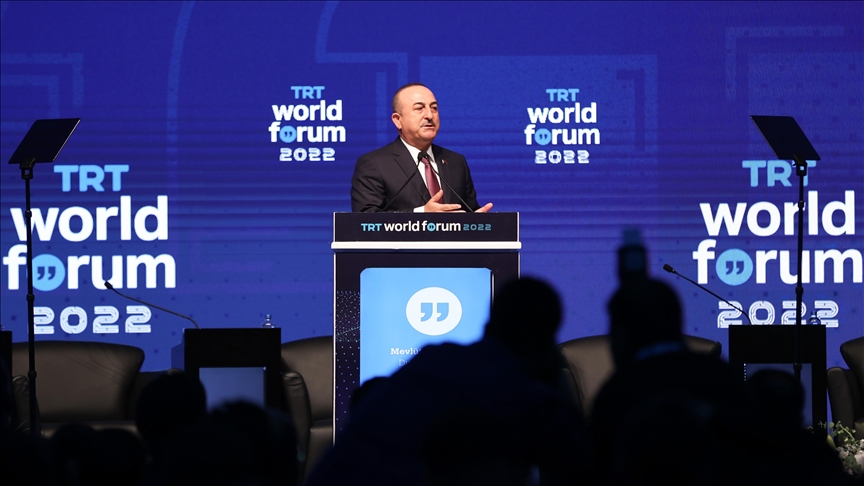ANKARA
The Turkish foreign minister on Saturday said no conflict is local in today’s “chaotic global landscape” due to the butterfly effect, and stressed the significance of conflict resolution and peacebuilding.
“With butterfly effect, there are no local conflicts. We cannot afford to remain idle in the face of these challenges and threats,” Mevlut Cavusoglu told a session titled Conflict Resolution and Peace Building: Shaping the Future of Global Leadership as part of the Turkish national broadcaster TRT’s World Forum 2022.
Conflicts are a part of the reality of human relationships as well as international relations, Cavusoglu said, adding that “after a brief period of calm and relief, international relations are again dominated by conflicts.”
“We need resolution and mediation abilities to leave these testing times behind,” he added.
Naming conflict management and conflict resolution as two broad terms addressing conflicts, the Turkish minister said there is a “philosophical difference” between the two terminologies.
“While the first school focuses on short-term goals, the second has a long-term concern on how to resolve or prevent conflicts,” he said.
Emphasizing that the world is in an “age of crisis,” Cavusoglu noted that not only there is a systemic change but also the conflicts today are transforming.
“With technological advances and globalization, conflicts are more complex, multi-layered, and widespread,” he said.
There are “classical wars, proxy wars, internal strife, asymmetrical and hybrid warfare, all at the same time,” he stressed, saying there are also “various frozen conflicts that continue to threaten peace,” with their resolutions frozen.
“Conflicting parties are weaponizing everything, from sanctions to trade, from digital platforms to access to energy and food resources,” he said, while stressing the need for “a comprehensive approach to conflict resolution.”
“For an effective conflict resolution, we need to focus on root causes, establish dialogue, rebuild trust, demonstrate leadership, take risks, and take action, have innovative methods, update our toolbox, and unite the power of academia and practitioners,” he said.
He further emphasized the need for strengthening “multilateral responses” and cited the landmark Black Sea grain initiative as “a case in point that saved the world from a serious food crisis.”
Saying that “geography is destiny,” the Turkish foreign minister noted: “Surrounded by 60% of global conflicts, including frozen ones, we also know the value of mediation and conflict resolution.”
“This is why we invested heavily in peace mediation. We are the only nation co-chairing three different Groups of Friends of Mediation in three major international organizations: the UN, the OSCE, and the OIC. Istanbul Mediation Conferences became the biggest annual global event gathering mediation practitioners from around the world,” he said.
Cavusoglu said Türkiye maintains a high profile as a facilitator or mediator from Somalia to Venezuela, the Balkans to the Middle East, as well as in the ongoing Russia-Ukraine war.
“According to our experience, at the heart of a successful mediation effort lies trust, leadership, and the ability to deliver. … Without (Turkish) President (Recep Tayyip) Erdogan’s leadership in diplomacy, the extension of the grain deal or prisoners’ exchanges wouldn’t have been possible,” he noted.
He further said there are two major views on the cause of conflicts, and named one as “conflicts to the scarcity of resources and power relations” and the second as “conflicts in perceptions.”
“The success of the mediator depends on convincing parties that their disputes are more about perceptions, rather than concrete issues,” he said, adding the need for “smart and result-oriented approaches” while encouraging “parties towards win-win formulas.”
TRT World Forum
The TRT World Forum 2022, a two-day annual event, started in Istanbul on Friday.
The gathering, this year held under the theme of Mapping the Future: Uncertainties, Realities and Opportunities, brings together academics, journalists, intellectuals, politicians, and members of civil society from around the globe.
Nearly 100 speakers and over 1,000 participants from nearly 40 countries are attending the forum, according to Mehmet Zahid Sobaci, the director general of TRT.
The forum will feature sessions on various subjects, such as the Moscow-Kyiv war, global migration, and the energy crisis, as well as disinformation.
The event is being held in person this year after it was held virtually in the past two years due to the COVID-19 pandemic.

